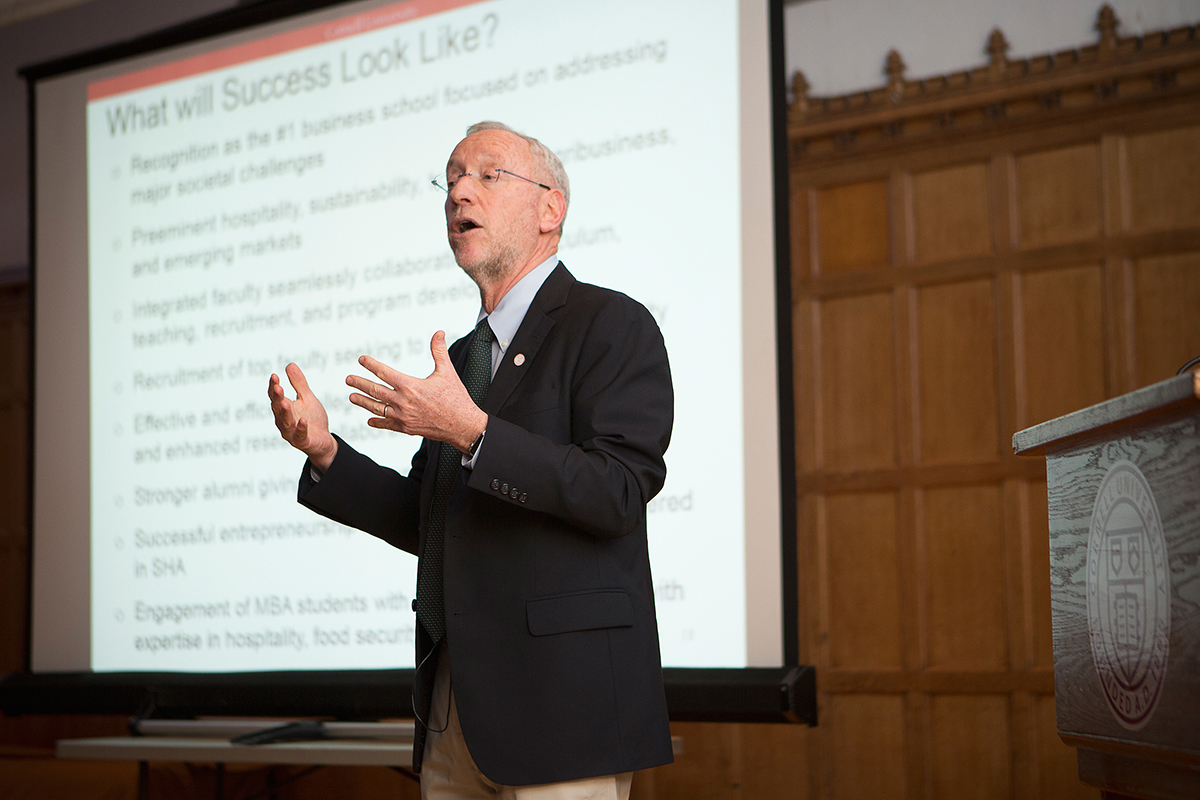'Business college of the future' will retain schools' identities
By Susan Kelley


With its new College of Business, Cornell has the opportunity to harness its unique excellence in hospitality, sustainability, technology, agribusiness and emerging markets, and become the country’s No. 1 business school addressing major societal challenges, from sustainability to wealth imbalance, creating “the business college of the future,” said Provost Michael Kotlikoff.
But to make that vision a reality, Cornell needs the insights and contributions of the entire Cornell community, he said, speaking Feb. 2 at an informational forum for students in Willard Straight Hall’s Memorial Room.
“We asked the trustees to create an empty vessel that is the Cornell College of Business. And we said, ‘[Cornell] leadership can’t define what’s in that vessel.’ That has to come from faculty. It has to have input from students. It has to have input from alumni and staff,” he said.
About 150 students – many from the School of Hotel Administration (SHA) – attended, nearly filling the room. Most of their questions involved their concerns that the new college will weaken SHA’s strengths: its top rankings, high student satisfaction, passionate alumni, and focus on real estate and entrepreneurship.
Although much remains to be decided about the college, one thing is clear, Kotlikoff said: Each of the three accredited business schools that will comprise the college – SHA, the Charles H. Dyson School of Applied Economics and Management (Dyson) and the Samuel Curtis Johnson Graduate School of Management (Johnson) – will retain their unique academic cultures. “This is the strength of this emerging business school. We would be crazy to eliminate that strength. That’s the last thing we want to do,” he said.
In answer to students’ questions, Kotlikoff noted that each school will have its own dean and retain control over admissions, curriculum and philanthropy. In SHA’s case, that means it will have continuity of identity and its hospitality focus, including maintaining oversight of the Statler Hotel and industry outreach. Kotlikoff also has committed to enhancing support for the Baker Program in Real Estate and other SHA institutes. And, like the other schools, SHA will continue to be represented within the College of Business’s leadership transition team, he said.
Kotlikoff began the forum with the same 30-minute presentation that he gave to the Cornell Board of Trustees Jan. 30, making the academic case for the college and setting the stage to answer questions.
Since 2009, various faculty, trustee and other committees have reported that fragmentation of Cornell’s business schools is a problem and recommended consolidation.
“This is not a new problem,” Kotlikoff said. “What we’ve not been able to do is muster the ability to address this problem.”
Fragmentation creates a host of problems, Kotlikoff said. For example, SHA, Dyson and Johnson each go through a separate accreditation process.
Each has a relatively small number of faculty (45-60) compared with peers; Wharton has 220 and Harvard 173. Currently, with 60 faculty, Johnson is No. 15 in terms of number of faculty compared to its peers; the Cornell College of Business will be No. 3.
Moreover, a larger combined faculty will make it easier to recruit top-flight faculty and students, Kotlikoff said. “Last year each of our accredited business programs was searching for a finance faculty member. So we’re recruiting against ourselves, rather than working together.”
The same is true for the schools’ operating budgets. Johnson is No. 14 in size of operating budget among its peers; the new college will be No. 4.
It’s been difficult for students to take classes in other schools, because of different schedules and tuition flow. And unwieldy administrative logistics made an entrepreneurship minor difficult to create; the new college will facilitate it.
The College of Business will enhance cross-disciplinary research, and faculty and student interactions, and expand opportunities for joint graduate, professional and executive education programs. And it will do so with shared support services and administrative expertise, he said.
“I hope that you, as students, think about where we’re going and not where we’ve been,” Kotlikoff said at the close of his presentation. “And that’s what I say to our alumni as often as I can. I know the risks. We all know the risks. … We will be working on mitigating those risks. But we have to secure the future. Our job is to create something better and leave this place stronger than we found it. And that is what this initiative is fundamentally about.”
Media Contact
Get Cornell news delivered right to your inbox.
Subscribe